
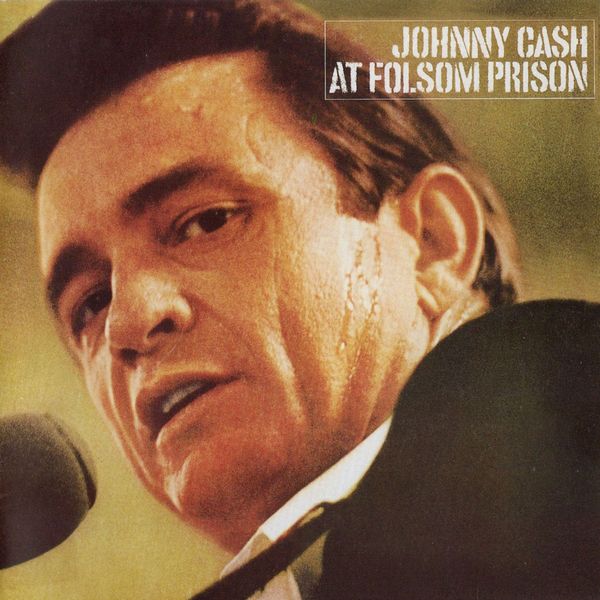 |
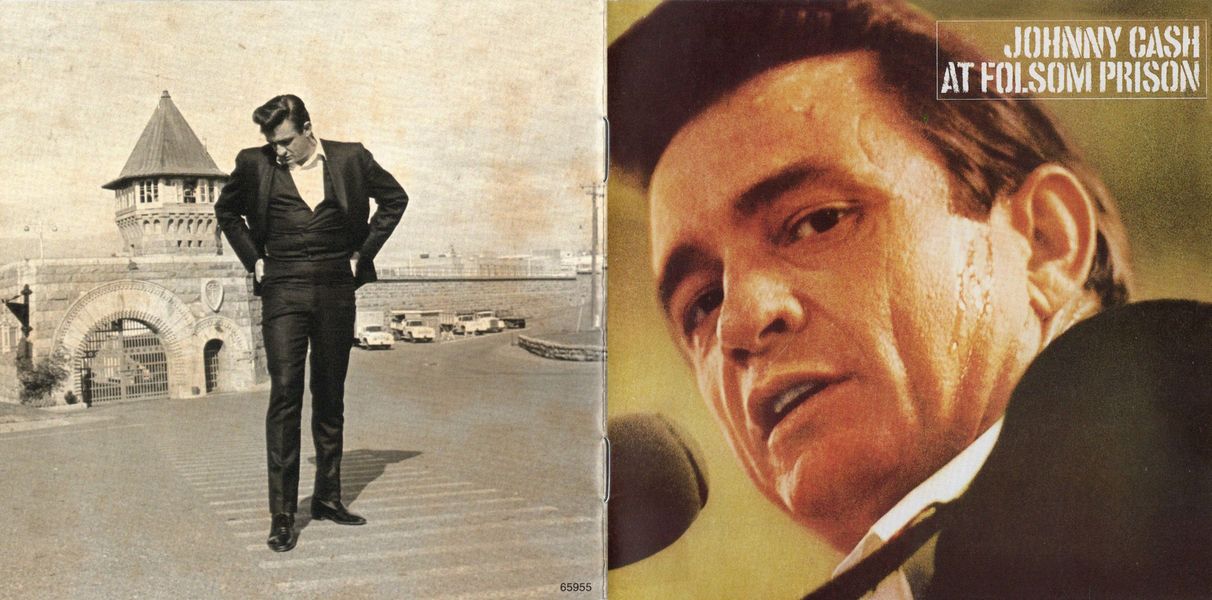
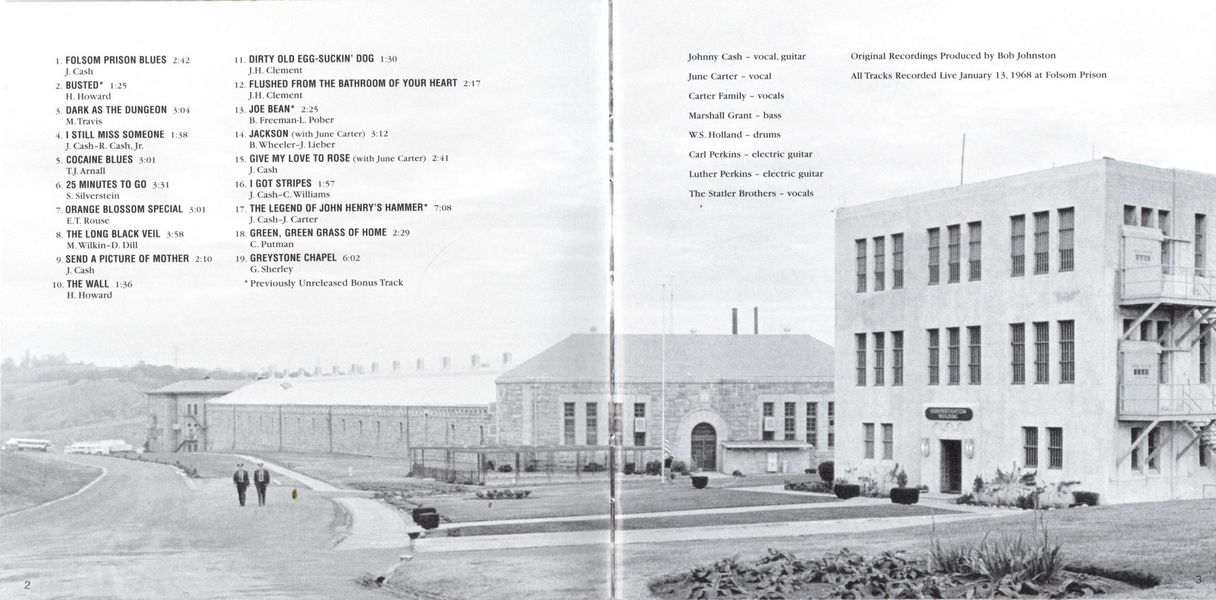
|
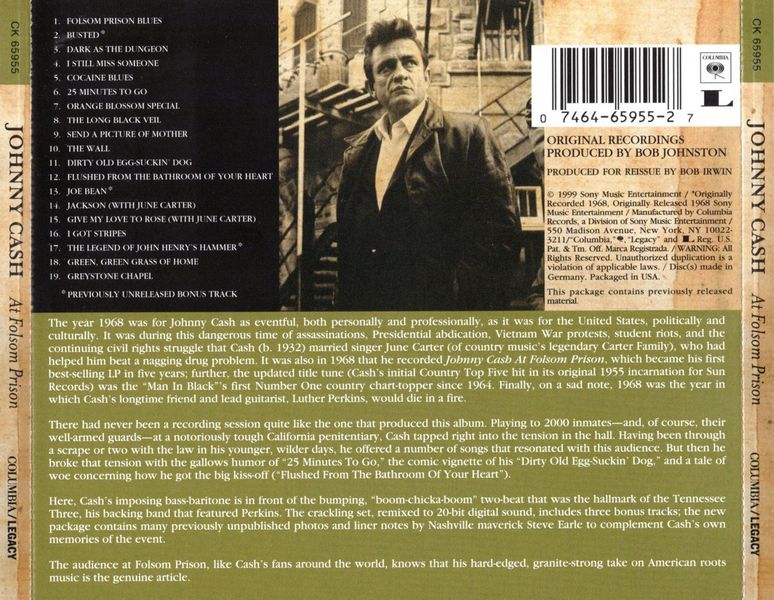
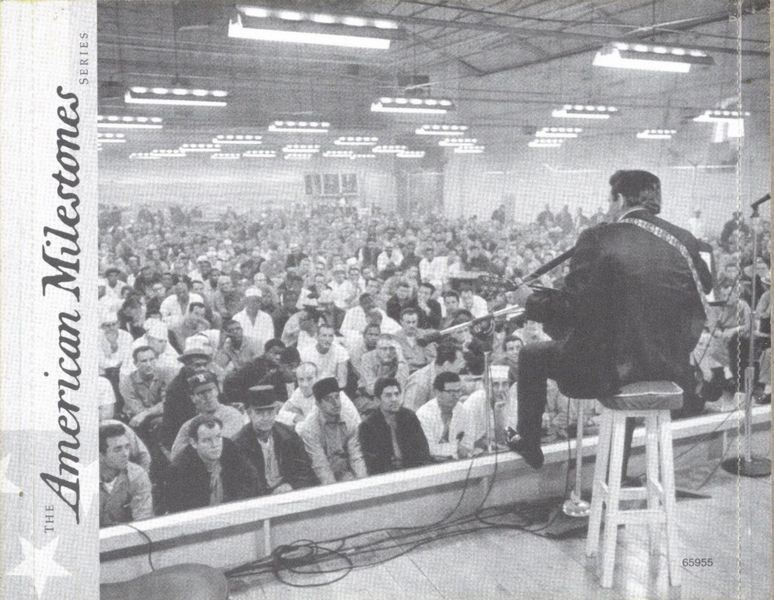
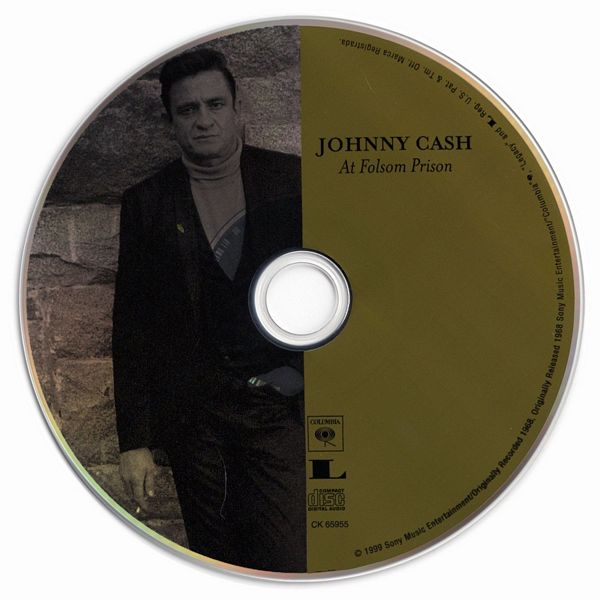 |
| more images |
Sleeve Notes
Folsom Prison Blues
The culture of a thousand years is shattered with the clanging of the cell door behind you. Life outside, behind you immediately becomes unreal. You begin to not care that it exists. All you have with you in the cell is your bare animal instincts.
I speak partly from experience. I have been behind bars a few times. Sometimes of my own volition sometimes involuntarily. Each time, I felt the same feeling of kinship with my fellow prisoners.
Behind the bars, locked out from "society," you're being re-habilitated, corrected, re-briefed, re-educated on life itself, without you having the opportunity of really reliving it. You're the object of a widely planned program combining isolation, punishment, taming, briefing, etc., designed to make you sorry for your mistakes, to re-enlighten you on what you should and shouldn't do outside, so that when you're released, if you ever are, you can come out clean, to a world that's supposed to welcome you and forgive you.
Can it work??? "Hell NO." you say. How could this torment possibly do anybody any good … But then, why else are you locked in?
You sit on your cold, steel mattressless bunk and watch a cockroach crawl out from under the filthy commode, and you don't kill it. You envy the roach as you watch it crawl out under the cell door.
Down the cell block you hear a steel door open, then close. Like every other man that hears it, your first unconscious thought reaction is that it's someone coming to let you out, but you know it isn't.
You count the steel bars on the door so many times that you hate yourself for it. Your big accomplishment for the day is a mathematical deduction. You are positive of this, and only this: There are nine vertical, and sixteen horizontal bars on your door.
Down the hall another door opens and closes, then a guard walks by without looking at you, and on out another door.
"The son of a … "
You'd like to say that you are waiting for something, but nothing ever happens. There is nothing to look forward to.
You make friends in the prison. You become one in a "clique," whose purpose is nothing. Nobody is richer or poorer than the other. The only way wealth is measured is by the amount of tobacco a man has, or "Duffy's Hay" as tobacco is called.
All of you have had the same things snuffed out of your lives. Every thing it seems that makes a man a man. a woman, money, a family, a job, the open road, the city, the country, ambition, power, success, failure — a million things.
Outside your cellblock is a wall. Outside that wall is another wall. It's twenty feet high, and its granite blocks go down another eight feet in the ground. You know you're here to stay, and for some reason you'd like to stay alive — and not rot.
So for the fourth time I have done so in California, I brought my show to Folsom. Prisoners are the greatest audience that an entertainer can perform for. We bring them a ray of sunshine in their dungeon and they're not ashamed to respond, and show their appreciation. And after six years of talking I finally found the man who would listen at Columbia Records. Bob Johnston believed me when I told him that a prison would be the place to record an album live.
Here's the proof. Listen closely to this album and you hear in the background the clanging of the doors, the shrill of the whistle, the shout of the men … even laughter from men who had forgotten how to laugh.
But mostly you'll feel the electricity, and hear the single pulsation of two thousand heartbeats in men who have had their hearts torn out, as well as their minds, their nervous systems, and their souls.
Hear the sounds of the men, the convicts all brothers of mine with the Folsom Prison Blues.
Johnny Cash
The show at Folsom in 1968 was a long one and I always thought that the songs that were not on the album were as worthy of being heard as the ones that were.
And memories … there are scenes as sharp in my memory as if it were last night! The look on Glen Sherley's face as I announced his song, the reaction from the cons when I introduced myself, and the faces. The pain and hopelessness of a soul beaten down; of failure, of failure to stay free of the system, of failure to be able to ignore today's pain.
But there are swelling balloons of joy to burst in a couple of hours for sure when they have to go back to their cells. But, for now, let it blow! We are in the timeless now. There is no calendar inside the cafeteria today, January 13, 1968.
I'm singing sweet hymns to them of mother, Jesus, freedom, children. But, of course the walls as well, and the joyous, most sacred, freedom of the spirit.
Dig in, join in, share in the joy with men who only had a couple of hours in months, maybe years time. There's some stuff here I'm proud of …
Johnny Cash
June, 1999
JOHNNY CASH AT FOLSOM PRISON was the first "country" record I ever listened to from beginning to end. My uncle, Arlon Earle, owned it and we were visiting him in Jacksonville, Texas. I first heard Hank Williams, Bob Wills, Jimmie Rodgers, and Ray Price, in that house — "hillbilly records" he called them, so I called them that, too. As I got older and discovered the Beatles and the Stones and Bob Dylan, only Johnny Cash survived the shift in my musical tastes. Cash was different.
He was a BADASS. He wore a lot of black and he sang about murder and dope and adultery and ghosts. He had genuine attitude. His music, more than anyone else's, was simultaneously COUNTRY and ROCK.
In 1968 John had his own television show and I NEVER, EVER missed it. I saw Neil Young, Linda Ronstadt and in his first network appearance, Bob Dylan. All during the most formative period in my musical life. Nothing else would influence as much as that hour a week until I met Townes Van Zandt in 1972.
I finally met John in 1987 at a photo session for a newspaper article publicizing a benefit we shared the bill on. Present were John, myself, Waylon Jennings and Mark Germino. It was John who noticed that everyone in the picture was wearing black except him.
In 1991 I dropped off the edge of the earth, resurfacing in '95 by way of the Davidson County Criminal Justice Center. Later that year Ry Cooder asked me to play electric guitar on John's contribution to the Dead Man Walking soundtrack. (I got to "be" Luther Perkins. How cool is that?) I hadn't seen John since I went away and when I walked into the green room at 16th Avenue Sound, he was standing over the pool table with his hand in an old fashioned picnic basket. He looked up when I entered the room and said "Steve — would you like a piece of tenderloin on a biscuit that June made this mornin'?" I allowed how I would and he said "I knew that you would." Then we went in and made a record — as if nothing bad had ever happened to either one of us.
Steve Earle
Troy NY, June 1999